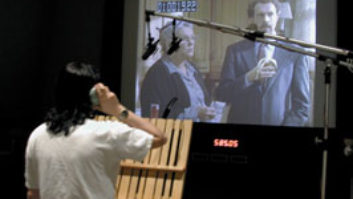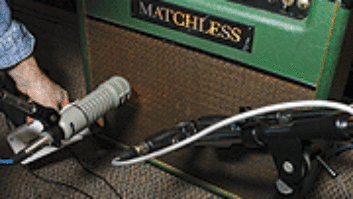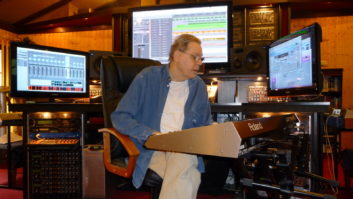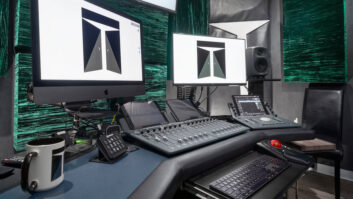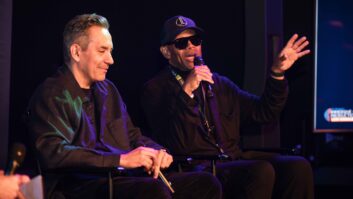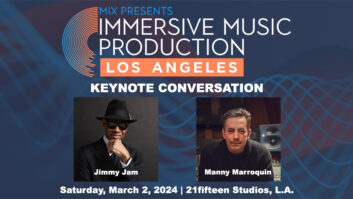Justin Townes Earle just released his new album Absent Fathers in January as a companion piece to Single Mothers, which was released last year to critical acclaim. Absent Fathers marks the seventh release for Earle, who is among the most authentic alt/country artists to have emerged from Nashville in the past decade.
The production on Justin Townes Earle’s Absent Fathers is simplified and back to basics, harkening back to his first solo EP while still a being a collaboration.
Since 2007, Earle has maintained a loyal partnership with producer Adam Bednarik, who has helped Earle capture a sound that instantly recognizable as his own. Absent Fathers reaches deeper and more introspective writing terrain for Earle, and its production is both spacious and open—making it sound ‘unforced’ and extremely easy to listen to. Pro Sound News talked to the pair about the ‘importance of being earnest’ while recording.
On Keeping It Sparse
Adam: Justin hadn’t put anything out for a while, so he had a lot to say. We tried to keep it pretty sparse and let the songs speak for themselves. We also wanted to make sure he could go out and try to recreate these songs in a live setting. Also, I think we wanted to try to create something a little different than what we had done in the past and do our best to just let the music speak.
On Culling New Material
Justin: Luckily, life doesn’t have to shut down around me to write songs. Actually, I seem to write better sometimes when life moves faster. I write my records to be records— there are never a bunch of extra songs just lying around. I wanted to make something that would get people prepared for a more stripped down idea while still letting the songs stand out. Our previous records were produced with a lot of instrumentation, so I wanted to get as close as I could to my first EP, but without making it a solo record. I am a lot more self-assured and confident in how I want to record because I’ve got somebody like Adam to help me.
On Recording Drums and Vocals
Adam: I tried to capture everything in the most natural way I could, and I try to keep it simple and minimal as far as the amount of microphones I use. The kick drum had a front head on it, and I miked it with a Shure SM7 and I had an SM57 on the snare. Then I had a mic on a rack and a floor tom, two overhead mics and a pair of room microphones: that was it. For the overheads, I used a pair of Coles 4038s and I used Neumann KM 86s for the room mics.
Justin: Adam really knows how to mic my voice, capture all my breaths and everything that goes along with singing. My vocals are always cut live and I never go back and re-record them—it just doesn’t feel natural to me. I believe that capturing the vocals live can add to the recording in a major way.
On the Divergent Paces of Writing and Recording
Justin: I can be a painfully slow songwriter, and sometimes the simplest songs can take the longest. Over the course of writing, I have a lot of time and sometimes it is hard to concentrate on one thing; ideas are flowing through my head on what instrumentation to use, and things like what tones I want to choose for the song. Despite this, we tend to make records very fast.
Adam: Most of the time, we are looking at around a week to track a record. For this one, we spent about two weeks, which is a long time for us. We were moving at a pace of about two songs a day, which is pretty darn fast. At the beginning of each session, when Justin is ready to go, I just make sure that I’m ready and that we capture everything that may happen. Sometimes if there is a hiccup it might be OK because a performance was so great.
On “Respect for Space”
Justin: God knows what kinds of records and productions I am going to do over the course of my career, however long that lasts, but I have a very big respect for space. When I listen to Booker T. & the M.G.s for instance, the most impressive thing to me is the space. I mean, you could drive a goddam Mack truck through those tracks. [When artists feel the need] to control every second and have their fingers on every string to feel good about a song, it can make it sound so forced. You can hear all this in the recordings though, and you know when it is not relaxed. The point of doing the record in the first place is to make the song stand out. I think even with the larger productions we’ve done in the past, we’ve managed to pull this off.
On Knowing One’s Role
Adam: We’re not crazy, overboard perfectionists. If there is good take and we like it, we’re going to go with it. Everything is cut live and everybody plays at the same time, and there is a very minimal amount of fixes. Part of the idea for Absent Fathers was to have it earnestly raw.
Justin: Adam and I have worked together for so long now — he’s worked on all of my records. I get into the production only as a listener. It’s an amazing thing to have a counterpoint like Adam. I cover most of the music and things like that, and Adam focuses on the sounds and the mics without my input. So I’m not sitting in there saying things like, ‘Why don’t you use this mic? I think it would sound much better.’ I mean, why would you work with someone you don’t trust fully?
